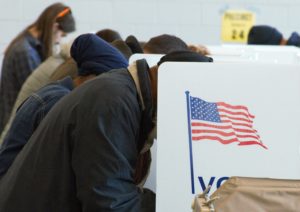By Paul Rozycki
Donald Trump is running for president next year.
He’s also facing 91 felony charges in both federal and state jurisdictions.
With the first Republican debate last month behind us, we are about to begin the 2024 presidential election campaign. It may be the most unusual and challenging election we have ever seen.
With over a dozen potential Republican candidates vying for the nomination only one name had been dominating the headlines—Donald Trump, who is currently facing 91 criminal charges in four different jurisdictions. He is leading all other challengers for the nomination by a large margin and it appears that he may be facing a series of trials during the first six months of 2024, just as the primary elections are taking place to pick the nominees for the Democratic and Republican parties. If the trials take place as scheduled they may dominate the headlines as much as any of the primary contests.

Trump merchandise at a Vice President Mike Pence 2020 campaign stop at Bishop Airport in Flint. (Photo by Tom Travis)
As things stand now, Trump is facing four major criminal indictments, summarized here:
Stormy Daniels hush money
In March of 2023, Trump was indicted in New York on 34 counts of falsifying business records over his payment of $130,000 of hush money to porn star Stormy Daniels. The case is scheduled for trial in March of 2024. This was the first time a former U.S. president was charged with a crime after leaving office.
Classified documents kept at Mar-a-Lago
In June of 2023, Trump was indicted, facing 37 federal criminal charges for illegally keeping classified and secret documents after the left the White House and refusing to turn them over to authorities when requested. The trial is scheduled for May of 2024. Thirty-two counts were for the willful retention of national defense information. The other counts included attempting to alter, destroy, or conceal evidence.
Federal Election Certification and the Jan. 6 insurrection
On Aug. 1, the former president was charged with four criminal indictments relating to the certification of the 2020 election. Among other things, he was charged with conspiracy to defraud the United States “by using dishonesty, fraud and deceit to obstruct the nation’s process of collecting, counting, and certifying the results of the presidential election.”
As part of his attempt to overturn the 2020 election Trump has been charged with a number of federal crimes for his support of the riots in and around the Capitol on Jan. 6, 2021. Like the Georgia indictment, the case includes charges relating to the false elector scheme. In addition to Georgia, the indictment includes activity in Michigan, Pennsylvania, Arizona, and other states where Trump lost and tried to overturn the results with false electors.
Attempts to overturn the Georgia election results
On Aug. 15, Trump was charged with election interference in Fulton County, Georgia, where he pressured local election officials to “find 11,780” votes for him in an attempt to overturn the 2020 election. Trump and 18 other officials are charged in the Georgia case. Among those charged are close Trump allies, attorney and former New York Mayor Rudy Giuliani and Chief of Staff Mark Meadows.
If all 19 are to face trial this may be the most important and complex of the four cases. Yet many suspect that more than a few of the defendants will be bargain for lesser charges in exchange for testifying against Trump. Among the charges filed in this indictment are a violation of Georgia’s Racketeer Influenced and Corrupt Organizations (RICO) Act and a solicitation of a public officer to violate their oath of office. Many consider this the most serious of the indictments.
At this point, as noted, Trump is facing 91 felony charges filed since March of 2022. Some also say they believe Trump could also face further indictments in those states where false electors were put forward to overturn the 2020 election.
What all this could mean for the 2024 election
If he is convicted on any or all of these, the result could be prison time for Trump and others. What could this mean for the election?
We have never had a major presidential candidate facing jail or prison as they campaigned, though in 1920, Eugene Debs was in prison as he ran on the third-party Socialist ticket that year, earning three percent of the vote. In 1992, minor party candidate Lyndon LaRouche ran while in prison for tax fraud. If Trump were elected and convicted could he serve as president? The Constitution doesn’t forbid it.
The nomination
As the indictments piled up for Trump, one would expect it to be fatal to his campaign. So far, the opposite has been the case. As he claims to be the victim of a “witch-hunt” he has raised more money than expected for the campaign (and his legal fees), and his standing in the polls has bumped up among his Republican MAGA supporters. Several current polls show him 40 points ahead of his nearest Republican challenger.
That of course, could all change, as the campaign season builds. But at the moment it seems that the dozen or more Republicans challenging Trump may split up the vote so much that Trump could win the nomination with a plurality of the votes, as he did in 2016, when he was also one among many candidates. If he fails to get the Republican nomination will he run as a third party candidate?
The election
Most polls show that while Trump is holding his own or gaining among his hard core supporters, the criminal indictments are hurting him among independent voters, suburban Republicans, and any Democrats who might have voted for him. Many Democrats and more than a few Republicans see him as a weak candidate for the general election. Yet, that could all change as well. Because of his age and partisan division, President Biden’s polls are worrisome as he approaches the election year — and Hunter Biden’s legal problems won’t help. The entrance of third parties could also play a role in the outcome next year.
While we pay most attention to the presidential contest, after the 2020 election many of those who claimed that the election was fraudulent have run for state and local offices, such as election clerks. They will be in a position to oversee the counting of votes and the registration of new voters. Other election officials have faced threats as they tried to do their jobs and some have quit. After the 2020 election, some of the fumbling attempts to overturn it often had a Three Stooges—Keystone Kops quality to it. But in 2024 those who tried to overturn the last election may be back, be better organized, and a greater threat. We need to pay attention to those often ignored state and local elections. They will be critical next year.

Voters at a Ward 7 polling station in Flint’s College-Cultural Neighborhood. (Photo by Tom Travis)
If Trump wins
If Trump should win, almost certainly the federal charges would disappear, either with a new attorney general or a pardon. However, he would not have the power to dismiss or pardon for the state charges. In his public statements he has said he would “go after” those who brought the charges against him and it could get very nasty.
While the trials are scheduled for early 2024, Trump’s attorneys have been attempting to delay them until after the election. Many of the cases are complex and could face a long trials or delays. If any of the trials result in an acquittal or a hung jury, it’s likely that Trump will claim victory and blame others for the “witch hunt.”
If he loses, will the Republican Party move beyond Trump and the MAGA movement?
In almost every election year it is said to be “the most important election” of our lives. But in 2024 that may be true. It will likely be the strangest and democracy may be on the line as never before.
 EVM political columnist Paul Rozycki can be reached at paul.rozycki@mcc.edu.
EVM political columnist Paul Rozycki can be reached at paul.rozycki@mcc.edu.


You must be logged in to post a comment.